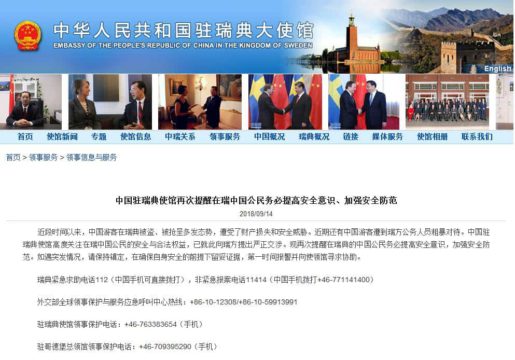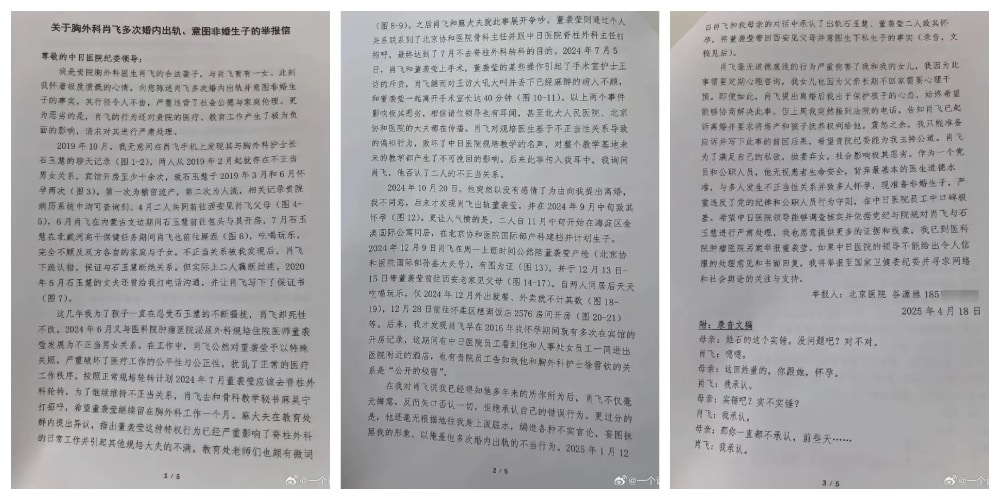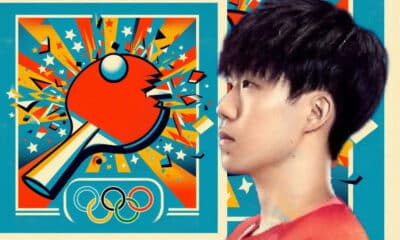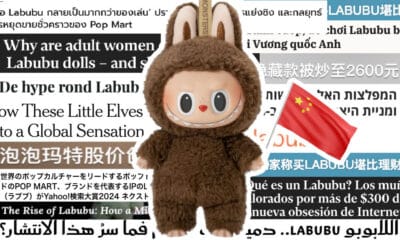China Insight
“This is Swedish Police!” – Sweden under Fire in China for “Brutal Abuse” of Chinese Tourists
Swedish police drag Chinese tourists out of hotel – some call them thugs, but others say it is the Chinese who were misbehaving.
Published
7 years agoon

The maltreatment of a Chinese family in Stockholm earlier this month has ignited major discussions on Chinese social media, and has led to the Chinese Embassy in Sweden issuing a safety alert for Chinese tourists visiting the country. Many netizens are skeptical of the trending incident.
Over the past few days, an incident that took place in Sweden earlier this month has attracted major attention on Chinese social media.
Bystander videos going around Chinese social media show how a Chinese man is dragged out of a hotel by Swedish police, and later shows a woman and young man are crying on the street outside of a hotel (updated: see video).
According to various Chinese news reports, the incident involves the Chinese family Zeng (曾), a younger man and his two senior parents, that was traveling to Sweden’s capital Stockholm on September 2nd.
When they arrived at their hotel, the Generator Stockholm hostel, it was not yet check-in time. The family suggested they would pay a fee to the hotel as long as they could wait in the lobby until they could check in to their hotel rooms. Zeng’s father reportedly is 67 years old and suffers from cardiovascular disease.
Sina News reports that the hotel refused the family’s request and even called the police to have the Chinese tourists removed from their lobby in the middle of the night, though both parents claimed they were feeling sick.
State media outlet ECNS writes that the police also denied the family’s request to stay at the hotel, and dragged his father out of the lobby and threw him to the ground outside.
The man later claimed on Chinese social media that his father consequently lost consciousness and that his body started twitching. Zeng and his parents were allegedly taken away from the hotel in a police car and were dropped off near a cemetery in the city’s suburbs.
的照片-480x360.jpg)
The family then received help from bystanders in getting back to the city center, where they reported the incident to the Chinese embassy.
THE AFTERMATH
“This has inevitably raised questions over Sweden’s ability to protect human rights and conduct law enforcement in a civilized manner.“
Chinese media are greatly criticizing Swedish authorities for how they have handled the incident; both that night and during the aftermath. Swedish authorities did not respond to the issue for two weeks after it occurred.
On Friday, September 14, the Chinese Embassy in Sweden issued a safety alert, stating that recently, there are more cases where Chinese tourists have been victims of theft and robbery, as well as cases where victims were treated poorly by Swedish police.

A day later, the Chinese Embassy in Sweden also issued a statement regarding the “brutal abuse of Chinese tourists by Swedish police,” writing:
“Around midnight on 2 September, three Chinese tourists were brutally abused by the Swedish police. The Chinese Embassy in Sweden is deeply appalled and angered by what happened and strongly condemns the behavior of the Swedish police. The Embassy and Ministry of Foreign Affairs of China have made solemn representations to the Swedish government respectively in Stockholm and Beijing, stressing that what the police had done severely endangered the life and violated the basic human rights of the Chinese citizens. We urged the Swedish government to conduct thorough and immediate investigation, and respond to the Chinese citizens’ requests for punishment, apology and compensation in time. We cannot understand why the Swedish side has not given us any feedback. We hope that the Swedish side will handle the case in accordance with law, and urge the Swedish side again to take immediate actions to protect the safety and legitimate rights and interests of Chinese citizens in Sweden.”
Swedish media first reported the incident on Saturday, September 15 (Aftonbladet). On Sunday, September 16, the Swedish Embassy finally responded to the issue. A statement on their official Weibo account said that the Embassy is aware of the case and is assigning a special prosecutor to investigate the case and to determine whether or not the Swedish police have used improper violence. As clarified by a spokesperson of the Embassy of Sweden to What’s on Weibo: “The Embassy has not assigned the special prosecutor, as you can read in our statement. Instead, the prosecutor is assigned automatically every time an incident of alleged police misconduct is reported.”

According to a column on the website of English-language Chinese state broadcaster CGTN, the incident is now also one about a Swedish human rights protection:
“(..) the way the local police in downtown Stockholm conducted themselves during the incident in a city hotel and on the streets on September 2 has inevitably raised questions over Sweden’s ability to protect human rights and conduct law enforcement in a civilized manner.”
SOCIAL MEDIA RESPONSES
“Is this the police or the criminal underworld?“
On Chinese social media, responses to the incident have been mixed. Many people feel that the family unnecessarily “made a big scene,” and condemn the young Mr. Zeng for “falling down on the ground as a crying baby.” They also say that these Chinese tourists are a “disgrace”: “They might as well have buried them at the graveyard,” some commenters write.
But there are also those who do not understand why the Swedish police handled the case in this way, taking the family in a police car and dropping them on a suburban curbside some six kilometers away, instead of bringing them to the police station or another hotel for the night.
“Perhaps the behavior of these three Chinese citizens was not very appropriate, but two of them are old people, they are not familiar with the area. To throw them out in the early morning, miles away at a cemetery where there are no hotels or stores, is really incorrect behavior by the Swedish police.”

From hotel lobby to suburban curbside; screenshot posted by Chinese netizens.
One well-known law blogger (@易辩任煜) wrote on Weibo: “It’s ok to enforce law and to bring people back to the police station and to give them a fine or something like that, but to throw them out like that? Is this the police or the criminal underworld?
There are also Chinese (micro-) bloggers who claim that the fact that this incident is making headlines in Chinese state media now relates to the Dalai Lama’s recent visit to Sweden, writing: “China just needs a reason to put pressure on them.”
“This is all about the visit of the Dalai Lama Sweden on the 12th,” many others claim.
By now, the hashtag “Chinese Tourists Maltreated by Swedish Police” (#中国游客遭瑞典警察粗暴对待#) has received more than 100 million views.
This is not the first time the maltreatment of Chinese tourists abroad receives mass attention in Chinese media. In January of 2016, pictures and a video of two Dutch boys emptying boxes of milk powder over Chinese tourists in Amsterdam also ignited major discussions.

The milkpowder incident.
In 2017, a video of a Chinese-looking man being dragged out of an overbooked United Airlines flight also went viral online in China, attracting tens of thousands of outraged posts on the discrimination of Chinese abroad. It later turned out that the passenger involved in the incident, now called the “United Express Flight 3411 Incident“, was not a Chinese citizen, but a 69-year-old Asian-American doctor from Kentucky.
About this incident, some Chinese social media users say that they think it will affect international relations between China and Sweden.
Update: since this original article was published on Sunday (Sept 16), this news item has made international headlines. For the latest developments and news facts in this matter check, for example, this Washington Post article.
Update 2: also read > “Nearly 40 Robberies in 3 Months Time”: Chinese Embassy in Sweden Issues Another Safety Alert
By Manya Koetse
With contributions by Miranda Barnes
Follow @whatsonweibo
Spotted a mistake or want to add something? Please let us know in comments below or email us.
©2018 Whatsonweibo. All rights reserved. Do not reproduce our content without permission – you can contact us at info@whatsonweibo.com.
Manya is the founder and editor-in-chief of What's on Weibo, offering independent analysis of social trends, online media, and digital culture in China for over a decade. Subscribe to gain access to content, including the Weibo Watch newsletter, which provides deeper insights into the China trends that matter. More about Manya at manyakoetse.com or follow on X.

China Insight
Understanding the Dr. Xiao Medical Scandal
Behind the scandal at the China-Japan Friendship Hospital: the doctor, the trainee, and the letter that took over the Chinese internet.
Published
2 months agoon
May 5, 2025
FROM THE WEIBO WATCH PREMIUM NEWSLETTER
Dear Reader,
A controversy that has been brewing recently has completely taken over the Chinese internet over the past week, becoming the biggest public scandal on Chinese social media in 2025 so far.
At the center of it all is Dr. Xiao Fei, a well-known thoracic surgeon at the prestigious China-Japan Friendship Hospital in Beijing who has come under fire in the medical world following revelations that he cheated on his wife with a head nurse, a trainee, and others.
This may sound like a Chinese version of an episode of Grey’s Anatomy, but it goes far beyond messy relationships alone and reveals serious social concerns and exposes deeper systemic problems involving academic and medical institutions.
To understand how this unfolded, I’ll walk you through the main people involved, the events that led up to it, and the key issues that turned this medical controversy into a nationwide talking point.
Main People Involved
👨⚕️ Xiao Fei (肖飞): associate chief thoracic surgeon at the China-Japan Friendship Hospital (中日友好医院) in Beijing, with a PhD in surgery from Peking University’s medicine department. He had worked at the China-Japan Friendship Hospital since 2012, rising from resident doctor to associate chief surgeon, and was selected for the hospital’s “Elite Program” (菁英计划). He also served as a graduate advisor at Peking Union Medical College (北京协和医学院). A former Communist Party member, he was awarded the title of “Outstanding Communist Party Member” (优秀共产党员) at the hospital in 2020. Xiao is the central figure in the scandal involving multiple affairs and professional misconduct. Born in 1986 and a native of Shaanxi.

The main people involved: Gu Xiaoya (lower left) and Xiao Fei, and Shi Yuhui (top left) and Dong Xiying.
👩⚕️ Gu Xiaoya (谷潇雅): associate chief ophthalmologist at Beijing Hospital. Legal wife of Xiao Fei and mother to their daughter. She also holds a PhD in clinical medicine from Peking University. She is the “whistleblower” who exposed the scandal through a detailed letter and supporting material backing up her claims. Native Beijinger.
👩⚕️ Shi Yuhui (石玉慧): head nurse of the thoracic surgery department at China-Japan Friendship Hospital. She began an affair with Xiao Fei in early 2019—both were married at the time. During their relationship, she became pregnant twice and miscarried both times. Despite interventions of her own husband and Xiao’s wife, she maintained contact with Xiao and allegedly harassed Gu Xiaoya through 2024. Born in 1981.
👩⚕️ Dong Xiying (董袭莹): former urology resident at China-Japan Friendship Hospital. Studied economics at Barnard College in New York (graduated in 2019), then earned her medical doctorate through the “4+4” clinical medicine program at Peking Union Medical College (北京协和医学院). Currently serves as a resident physician at the Cancer Hospital of the Chinese Academy of Medical Sciences. She comes from a privileged background: her father is an executive at a state-owned enterprise; her mother is a vice president at the University of Science and Technology Beijing (北京科技大学). She began a relationship with Xiao in 2024 and is reportedly pregnant with his child, due in June.
From One Letter to Nationwide Concern
This story first started to gain traction within various circles on Chinese social media since around April 21, when a long letter written by Gu Xiaoya (谷潇雅), the legal wife of the renowned surgeon Xiao Fei, was widely circulated, from WeChat to Weibo and Zhihu and beyond.
Soon, Chinese media outlets picked up the story, causing it to snowball and going trending on social media. The first time it trended on Weibo was on Sunday, April 27.
✉️ The letter that started it all
Gu’s letter, dated April 18, 2025, was addressed to the Disciplinary Committee at the China-Japan Friendship Hospital in Beijing. In the letter and attached materials, Gu Xiaoya details how her husband had been cheating on her since 2016 — including exact dates, locations, and chat records to support her claims.

First part of Gu’s letter
She writes that she wanted to report her husband’s extramarital affairs, as well as his apparent intent to have a child out of wedlock, because she believed his behavior “seriously violated social morality and professional ethics, and had a profoundly negative impact on both the hospital and the education of medical students.”
Gu explains that she first discovered Xiao Fei’s infidelity when she checked his phone in October 2019 and uncovered his secret affair with Shi Yuhui (石玉慧), a head nurse in his department, with whom he had been involved since at least February of that year. The two would also stay in hotel rooms together during trips, some work-related. According to Gu — and backed by hospital records — Shi became pregnant twice in 2019, both pregnancies ending in miscarriages.
Gu says that efforts to stop the affair were fruitless, even when Shi’s own husband was involved in trying to end the affair, and that Shi Yuhui continued to harass Gu for years afterward.
However, in June 2024, while on duty in the operating room, Xiao began another new affair — this time with Dong Xiying, a urology resident physician. Their relationship developed quickly. According to her medical training schedule, Dong was supposed to move on to another department in July 2024, but Xiao allegedly intervened to ensure she remained in thoracic surgery.
During this period, Gu claims that during a surgery on July 5, 2024, Xiao Fei had a dispute in the operating room involving his affair partner, Dong Xiying, and a nurse. As a result, Xiao left the operating room with Dong (allegedly to comfort her), even though a patient had already been anesthetized and was lying on the operating table. They were gone for 40 minutes, during which the anesthetist and nurse were left to manage the patient alone.
Gu mentions that medical staff involved in or aware of the operation later raised concerns in internal group chats or reported the incident directly to the hospital’s education or supervisory offices.

In a screenshot of the Surgical Anesthesia Department Nurses Group, one nurse said:
💬 “First thing in the morning, Xiao Fei was chaotic – he completely lost his temper on a phone call, tore off his surgical gown, and left the operating room. He called Zhang Ying (张颖) angrily saying if the circulating nurse wasn’t replaced, he would cancel the surgery. He then unfastened the scrubs of the trainee doctor Dong, and left with her. The surgery was left undone! They had just connected the electrosurgical unit when Xiao left with the trainee doctor, leaving the anesthetized patient lying in the OR. There is no doctor present during surgical time!”
In October 2024, Xiao filed for divorce. Gu later discovered that he was already living with Dong Xiying, who had become pregnant the previous month.
Gu also learned that Xiao had been involved in other affairs dating back to 2016, when Gu was pregnant with their daughter, and that he would stay at different hotels with various female members of staff and nurses.
She claims she initially hoped to avoid legal action, but Xiao’s threats to seek full custody of their daughter pushed her to expose his affairs and seek justice.
💥 Far-reaching consequences
On April 27 – the day this topic dropped in Weibo’s top trending lists – the China-Japan Friendship Hospital issued an official statement to respond to the controversy. The hospital confirmed that the allegations involving their staff member Dr. Xiao were basically true (#中日友好医院通报肖某问题属实#). They suspended Xiao while investigating the matter.
Soon, one statement after another, news reports and hashtags followed. Dr. Xiao was expelled from the Communist Party, his profile was removed from the hospital’s website, and his employment was terminated.
Around April 30, public attention began shifting toward Dong Xiying (董袭莹) and her academic credentials. The young physician, who graduated from Barnard College in New York with a degree in economics, entered the “4+4” MD/PhD medical training program at Peking Union Medical College (PUMC) in 2019. Within a few years, she was praised as a model student within the 4+4 track (non-medical undergraduate + 4 years medical training).
Netizens soon discovered that PUMC had been quietly removing articles from its website related to Dong. Her PhD thesis disappeared from public databases, and her name was edited out of the President’s Commencement Address. As more details about her privileged background surfaced, growing doubts emerged about her qualifications and how she gained admission to the program.
It is rumored that Dong has now left China for the US.
The hospital has not yet released details on how – and if – Shi Yuhui will be dealt with.
On May 1st, China’s National Health Commission announced an official investigation into the matter, looking into the allegations against Xiao and also reviewing the academic and work history of Dong Xiying.
The scandal has caused something of an earthquake — not just within medical circles, but also in academic ones, and across the internet at large, where netizens are particularly concerned about the broader social issues this story touches on.

Some netizens made mindmaps of the scandal to explain who the main persons nvolved are and what the key issues are. Shared by Qiao Kaiwan on Weibo.
There are many layers to this story, and perhaps more yet to be uncovered. One popular Weibo blogger (Qiao Kaiwan @乔凯文) commented about the scandal, and the role played by Dong Xiying:
💬 “(..) it’s rare for a central figure in a single case to touch on five major socially sensitive issues all at once: educational fairness (教育公平), doctor-patient trust (医患信任), marital fidelity (婚姻忠诚), class solidification [lack of upward mobility] (阶层固化), and academic corruption (学术腐败)…”
At its core, public concern centers around various major themes that are all tied to deeply rooted cultural values or long-standing social issues. Since there is some overlap within these topics, I’ll focus on three main values vs concerns here.
1. Fairness in Education & Corruption in Academia
Fairness and corruption within China’s education system are recurring hot social topics. Education is widely regarded as the main path to upward mobility, which makes the system fiercely competitive—starting as early as kindergarten. The pressure to succeed in the gaokao college entrance exams begins years before the tests are actually taken.
Most Chinese parents are willing to invest heavily in their children’s education, driven by the fear that their kids will fall behind. This intense competition is reflected in the popularity of the term nèijuǎn (内卷), “involution,” which describes a situation where students (or professionals) must overwork and go above and beyond just to keep up with peers. Everyone ends up standing on their toes to keep pushing the bar—yet no one moves forward (read more about this here).
Especially in such a competitive system, where entire families invest so much time, energy, and resources into helping younger generations succeed, academic corruption is a sensitive issue that affects trust in the entire system and exacerbates common people’s disillusionment with meritocracy. Yet academic corruption—ranging from plagiarism and data manipulation to power abuse and favoritism—has been a widespread and increasingly discussed problem in mainland China since the 1990s.
Central to the current controversy surrounding Xiao Fei and Dong Xiying is the “4+4 program,” an experimental and relatively new medical education model inspired by the American system. Unlike China’s traditional path (five years of undergraduate study in medicine followed by three years of graduate training), this program allows students to complete four years of non-medical undergraduate education, followed by four years of medical training. It’s a fast track in which students can begin practicing medicine after just one year of residency instead of three. It was originally intended to create opportunities for talented individuals who decide to pursue medicine later on in their academic careers.
It sounds good in theory, but many feel that the program—with its high undergraduate standards and required letters of recommendation—essentially serves as a “backdoor” into medicine for the elite. Only a small number of applicants are admitted: the quota for both the 2025 and 2026 cohorts at PUCM is just 45 students.
Online, many are questioning whether Dong really met the proper standards for admission. How could someone with an economics degree from a liberal arts college become a so-called “medical talent” in just a few years? In contrast, people have pointed to Chen Ruyue (陈如月), a finance graduate from the prestigious Peking University who was also passionate about medicine and applied for the same program, but was rejected. Netizens wonder, “Where is the fairness in medical education?”
Many suspect Dong benefited from privileged access via family connections—her mother Mi Zhenli (米振莉) is a vice president at the University of Science and Technology Beijing (USTB), and her father Dong Xiaohui (董晓辉) is a senior executive at a state-owned enterprise.
Suspicions deepened when people discovered that Dong’s PhD supervisor, the orthopedic academician Qiu Guixing (邱贵兴), had no connection to her research field. Her clinical trajectory involves many different areas, from gynecological imaging and internal medicine to thoracic surgery and urology, a seemingly patchy path that raised further questions because this “magical and legendary swift crossovers between medical fields”of Dong could supposedly only mean that she is either an “unprecedented genius” or that her stardom medical rise was faciliated by “countless invisible hands” (comments by popular Weibo blogger @庚白星君).
There’s more that’s raised eyebrows.
Dong’s academic publishing history shows that she authored eleven research papers over a period of three years across various disciplines, from orthopedics to gynecology and urology. There are doubts over the exact role played by Dong in some of these studies. Dong was still a resident at the lowest level with relatively little experience, yet was able to publish bladder cancer diagnosis and treatment guidelines—she was listed as the first author on three English-language papers about bladder cancer clinical guidelines. Some allege that her contributions, like translating Chinese guidelines to English, do not merit a first-author mention.
There are also concerns about plagiarism. Claims have emerged that Dong’s 2023 doctoral thesis shows significant similarities to an invention patent submitted in 2022 by several professors and Zhao Jihuai (赵基淮), a hearing-impaired graduate student from the University of Science and Technology Beijing (USTB), who is mentored by Professor Ban Xiaojuan (班晓娟), Dong’s aunt.
It also does not help that PUMC, once promoting Dong as a success story, has now deleted related articles from its site and edited her name out of the President’s Commencement Address that mentioned her.
Concerns about Dong’s academic background and the apparent bending of rules inevitably also cast a shadow over the medical institutions where she trained. According to Gu’s letter, Dong was expected to rotate through various departments as part of her residency. However, instead of moving on to spinal surgery after completing her thoracic surgery rotation, she was allowed to remain—allegedly due to personal connections and pressure from Dr. Xiao—even though the hospital’s education team had initially objected.
If true, this could not only point to routine abuses of power within the medical training systems, but also creates unease over how qualified doctors such a Dong actually are, which also affects the trust patients place in hospitals.
2. Trust Between Patients and Doctors & Medical Negligence
The main incident in this scandal that has sparked widespread controversy is the moment when Dr. Xiao reportedly left the operating room together with Dong for an entire 40 minutes during a surgery, leaving the anesthetized patient on the table.
The idea that even a chief doctor such as Xiao can violate medical ethics by leaving a surgery mid-procedure for 40 minutes deepens fears about medical professionalism.
Trust between patients and doctors and worries over medical negligence are recurring topics on Chinese social media. There have been dozens of incidents that previously went viral showing how some doctors abuse or scam patients, or put commercial interests above the health of their patients. Some stories that gained nationwide attention in previous years include an anesthesiologist from Shandong who live-streamed while a patient was undergoing gynecological surgery, or a young patient who was asked to pay more money while already undergoing a surgery.
Such distrust in doctor-patient relations flared up again in light of this incident, in which a sedated patient was, against all protocol, left on the operating table mid-surgery—allegedly due only to a quarrel between another nurse and Xiao’s mistress that made him angry.
Xiao has given two media interviews in response to the allegations. Regarding the claim that he stormed out of the operating room with Dong, leaving a patient behind, he reportedly stated that he was not gone for 40 minutes, but for a maximum of 20 minutes to calm down after a dispute.
Although Xiao has admitted to inappropriate relationships with a head nurse and a training resident physician (refuting allegations of affairs with other nurses or members of staff), he firmly denied more serious allegations involving medical safety.
In an interview with Jiupai News, he said:
💬 “I have clear supporting evidence that around 9 AM, I left the operating table after an argument. I left to coordinate, not to ‘demand.’ I coordinated with a senior staff member in the operating room about whether it would be possible to replace the circulating nurse under these circumstances. Then I went upstairs to measure my blood pressure, drink some water, and take some blood-pressure medication. After calming down a bit, I immediately returned to the OR. I believe this was entirely reasonable. In fact, I was precisely concerned about the patient’s safety. Before I left, I gave specific instructions to the nurse at the table. Our anesthesiologist was present as well, and their professional competence is fully sufficient to ensure the safety of a patient who had not yet undergone any surgical procedure.”
Regardless of the circumstances, the fact that Xiao Fei left an anesthetized patient during surgery is not only one of the reasons that cost him his job—it’s also one of the reasons why he has temporarily become the most hated doctor in China among the public.
The fact that he tried to defend his actions only seemed to aggravate public opinion against him: “So he thinks 20 minutes is a short time to leave a surgery?” some say; “completely outrageous,” “a serious threat to patient safety.”
“Xiao is morally bankrupt,” another commenter wrote: “He is still trying to make excuses for leaving the OR mid-surgery. As chief surgeon he seriously violated his professional values. Not only doesn’t he reflect, he doesn’t even have remorse.”
3. Moral Integrity & Marital Infidelity
In the end, this entire scandal started because Xiao was caught cheating with multiple women at his workplace. That alone is seen as a lack of moral integrity and a violation of professional ethics, which are also tied to corruption and power abuse.
In China’s corruption cases, extramarital affairs often serve as red flags — not every official with a mistress is corrupt, but most corrupt officials do have one.
One of the most high-profile public cases involving an extramarital affair was in 2023, when Chinese official Hu Jiyong (胡继勇), who held a high-ranking position at PetroChina, was caught walking hand in hand with his mistress by a TikTok photographer during a work trip to Chengdu.
Chinese state media wrote that “being a Communist Party of China member, Hu has moral obligations, which he transgressed by having an alleged extramarital affair.”
Hu Jiyong was dismissed from his positions as executive director, general manager, and Party Committee secretary. His mistress, coincidentally also a Miss Dong, also lost her job at the company. For Xiao Fei and Dong Xiying, the exposure of their illicit affair might have even more serious repercussions.
In the end, Gu’s letter had a major impact on everyone involved. Xiao’s actions not only carried serious consequences for Gu and their young daughter, but also ended his career, affected both Dong Xiying and Shi Yuhui and their families, and damaged the reputations of the China-Japan Friendship Hospital and PUMC.
The entire scandal is not really about Xiao or Dong anymore. It is about the entire system around them that facilitated their affair and made it possible to bend the rules and engage in unethical and unprofessional behavior.
On May 5, Chinese political commentator and columnist Sima Pingbang (@司马平邦), who has 7 million followers on Weibo, wrote: “What I think of the Xiao Fei and Dong Xiying incident: The academic authorities behind them must be brought down!”
Meanwhile, despite the serious concerns behind the scandal, plenty of people are also just enjoying the online spectacle. Some performers are even incorporating the story of Xiao and Dong into their comedy shows. It’s not Grey’s Anatomy — it’s actually much more dramatic, and hasn’t even reached its final episode yet…
Thanks to Miranda Barnes and Ruixin Zhang for their input and contributions to this newsletter.
Also, welcome to the new premium members of What’s on Weibo! Please know that I’m always open to suggestions—if you spot any noteworthy trends you’d like to learn more about, don’t hesitate to reach out. I always enjoy receiving your emails. It’s great to see the subscriber community growing.
That said, What’s on Weibo still needs to expand its member base to cover all costs and keep subscription prices as they are. If you enjoy one of our articles, this newsletter, or the site in general, please spread the word (or consider gifting a subscription to someone who might love it too)!
Best,
Manya
(follow on X, LinkedIn, or Instagram)
Thanks to Miranda Barnes and Ruixin Zhang for their input and contributions to this newsletter.
Spotted a mistake or want to add something? Please let us know in comments below or email us. First-time commenters, please be patient – we will have to manually approve your comment before it appears.
©2025 Whatsonweibo. All rights reserved. Do not reproduce our content without permission – you can contact us at info@whatsonweibo.com.
China Insight
China Is Not Censoring Its Social Media to Please the West
Russian recruitment ads, China’s censorship, and how Western media sometimes guess Beijing’s stance by reading between the wrong lines.
Published
3 months agoon
April 27, 2025
FROM THE WEIBO WATCH PREMIUM NEWSLETTER
Dear Reader,
Recently, news broke that two Chinese nationals were captured by Ukrainian forces while fighting on the Russian side in eastern Ukraine. Their capture quickly made international headlines, not just because of their nationality but also because of how they allegedly got there.
As I worked on an article about this case, I kept running into something noteworthy: the recurring assumption that if something is visible on Chinese social media, it must have the government’s tacit approval.
Here, I’ll briefly get into more about the story and why that assumption misses the mark.
Russian Army Ads on Chinese Social Media
Earlier this month, Ukrainian President Zelensky announced that two Chinese nationals fighting for Russia on Ukrainian soil were captured by Ukrainian troops. On Monday, April 14, the two Chinese men – handcuffed and guarded – spoke during a press conference in Kyiv. They were identified as the 33-year old Wang Guangjun (王广军) from Henan and the 26-year old Zhang Renbo (张仁波) from Jiangxi.

Zhang and Wang during the press conference, image via Weibo user @边沁-Bentham.
Zelensky has claimed that at least “several hundred” more Chinese citizens are fighting on Russia’s side in Ukraine. On April 9, he stated that Ukraine had obtained the surnames and passport details of 155 Chinese mercenaries recruited by Russia through social media platforms.
The Kyiv Independent reported that both Wang and Zhang stated that they were not sent to the war by the Chinese government, and joined of their own free will.
While Wang claims he joined the Russian army after seeing an advertisement on Chinese social media, Zhang said he came to Russia in December for construction work and was recruited for military service there. Both men joined for monetary gain. Wang said he was promised to make $2,000-$3,000 per month, but that his phone and bank card were later taken from him.
The news that Chinese nationals were captured while fighting on the Russian side made international headlines — particularly the claim that Russia is recruiting Chinese mercenaries through social media, which has become a focal point in various media reports, such as this one by The Guardian, this article by ABC News, and this video report by RFE.
Some reports, including the latter, suggest a link between online recruitment ads circulating on Chinese social media, Beijing’s stance toward Russia, and the fact that these ads have not been censored. Zelensky himself stated that Russia has been recruiting Chinese citizens via social media, and that “official Beijing knows about this.”
RFE writes:
📰✍️ “Zelenskyy himself has stopped short of saying the Chinese government authorized the mercenaries’ involvement in Ukraine, but he has accused Beijing of turning a blind eye to Russia’s recruitment of its citizens.
And there’s some indication Chinese authorities haven’t made a concerted effort to stop them.
The Chinese Internet is heavily censored, and social media is closely monitored and controlled, yet many of these recruitment posts — some of which are months old — are still online and being shared.”
Kafkaesque Territory
Over recent years, I have noticed a recurring assumption in English-language media coverage when it comes to interpreting China’s stance on certain issues — from international conflicts to social issues: if something is not censored, it is assumed to be officially condoned.
A 2023 report by Human Rights Watch (HRW), for example, argued that China needs to take more robust measures to combat anti-Black racism on social media platforms. The report suggested that Chinese authorities systematically fail to properly address this issue, and that platforms like Bilibili, Kuaishou, Weibo, and Xiaohongshu should intensify efforts to remove problematic content that perpetuates racial stereotypes, belittles interracial relationships, impersonates Black people, etc.
One radio editor who later called me to talk about this report also suggested that surely, if it was not being censored, the authorities must approve of it?
Similar discussions came up when there was a significant rise in anti-Jewish sentiments and anti-Semitic posts on Chinese social media after the beginning of the Israel-Hamas War. An opinion piece in the Washington Post by Josh Rogin titled “Fueling online antisemitism is China’s new tool against the West” argued that, because antisemitism was ubiquitous on Chinese social media, it thus must be promoted by Chinese authorities — suggesting that this is how it works “on China’s internet, where no opinion is allowed to flourish without government approval.”
Rogin wrote:
📰✍️ “This unprecedented surge in antisemitism online in China could be possible only with the blessing of the Chinese government, which appears to be using anti-Jewish hate as a tool of its anti-U.S. and anti-Western diplomacy.”
“Of course, not all criticism of Israel is antisemitic, and antisemitism existed in China before Oct. 7. But via its internet censorship regime and state-controlled media, Chinese authorities have been fueling the flames of anti-Jewish hate online.”
The piece also quoted Aaron Keyak, the US Deputy Special Envoy to Monitor and Combat Antisemitism, in saying:
📰✍️ “What we saw after October 7 was a drastic change in the social media within China. The antisemitism became more unplugged, more free-flowing,” (…) “And because we know that the Chinese internet is not free, that’s a conscious decision by the Chinese government to allow that kind of rhetoric to be greatly increased.”
The pervasiveness of both anti-Black racism and anti-Semitic content on Chinese social media raises significant concerns. Belonging to a different category of concern, it’s understandable that certain Russian army recruitment ads circulating on various Chinese platforms trigger some alarm bells.
However, this line of arguing that lumps together the censoring policies of various Chinese social media platforms and Beijing’s official stance is not only flawed — it is also heading into somewhat Kafkaesque territory, where Western media outlets, generally rooted in free speech ideals, end up criticizing China not for censoring too much, but for not censoring enough.
Getting China’s Censorship Dynamics Wrong
There are several misunderstandings in the line of thinking that if something circulates on Chinese social media, it must ipso facto be tolerated by the authorities.
🔍 1. Mistaking China’s Censorship Model for the Western One
First, it conflates how censorship operates on Chinese platforms with how moderation works on Western platforms.
Those who are not used to surfing around Weibo, Douyin, Kuaishou, and others might be surprised to find just how much questionable content remains uncensored on Chinese social media. From graphic violence to deadly accidents, bloody war videos, raunchy images, doxxing, discrimination, or dangerous stunts — scrolling these apps can sometimes seriously be bad for your blood pressure.
At the same time, doomscrolling Chinese social media also makes you realize how tightly platforms like Facebook, TikTok, YouTube, or Instagram are moderated (TikTok’s parent company is Chinese, but its community guidelines are tuned to align with EU/US standards). Even the slightest hint at shocking or sexual content or violence could get you flagged on Western social media.
(For example, one video I made years ago about a Chinese woman intentionally tripping a 4-year-old in a restaurant got flagged by YouTube for “graphic violence,” another post I made about a deadly flash flood in the mountains of Pengzhou was removed by TikTok for “promoting dangerous activities”).
The emergence of online videos showing military violence, assaults against women, bullying among schoolchildren, or irresponsible pet ownership does not suggest that Beijing tacitly endorses violence, misogyny, campus aggression, or animal cruelty. Rather, it reflects the realities of a vast and multifaceted online ecosystem where millions of videos, images, and posts get uploaded every single day, and where, with over a billion users, not every corner of social media is going to be wholesome or tightly controlled.
It also means that some issues, even though they could be considered sensitive, are not prioritized by social media moderating systems (whether automated or human) or by Chinese regulators.
🔄 2. China’s Censorship is Selective and Shifts Over Time
Censorship in China is not static. It constantly changes in response to evolving and changing social, economic, and (geo)political contexts.
There are many laws & regulations regarding online content, involving the Cyberspace Administration of China (CAC) and other regulatory bodies, which set rules for internet content — from Weibo posts to online advertisements, from livestreaming to online series and web novels. Social media platforms moderate their own content in various ways, adhering to state regulators and self-censoring through AI algorithms and human reviewers.
Outside the regulatory framework, there is a lot of grey area. For state regulators, social media censorship is just one way to protect national security, Party power, economic stability, and cultural cohesion. For Chinese platform businesses, it is a necessary evil — they must navigate complicated dynamics between keeping social media flourishing while keeping (cyberspace) authorities content. If they don’t, they risk punishment, which affects business. They are busy enough moderating priority content and generally won’t touch content that poses no immediate threat to their operations, even if it could be considered sensitive.
This doesn’t mean censorship cannot fluctuate with the times — on the contrary, it changes all the time. Something that once seemed unharmful might later be perceived as disruptive and still get censored.
In some ways, there is overlap with how companies like Meta (Facebook, Instagram) moderate their content; they also use a combination of AI tools and human moderators to identify and remove content. However, the regulatory frameworks from which they operate are closely tied to their respective legal, historical, and social contexts, resulting in very different censorship practices.
One thing that is prevalent in the guidelines of companies like Meta or Google is the need to keep content far away from explicit material or violent and shocking content, in order to remain “advertiser-friendly” within their socio-cultural and legal contexts. This is very different from the Chinese online environment, where one of the main priorities for social media companies is to avoid politically controversial or subversive content to keep things as “Party-friendly” as possible.
🌏 3. Imposing Western Ethical Standards on China
An (overlapping) misunderstanding behind the suggestion that any sensitive or questionable content that emerges on Chinese social media must be tolerated by the authorities is that Western media outlets are projecting Western ethical standards onto China’s internet governance.
Assuming that all sensitive content must be immediately censored or flagged — because that’s what would happen under Western frameworks — ignores China’s different historical, political, and social contexts.
China’s censorship is not intended to please the West; it serves domestic political, cultural, economic and social goals under the Party’s leadership. Besides the censorship, there’s a major propaganda apparatus that goes beyond deleting posts and focuses on guiding public opinion and controlling the official narrative.
Criticizing China for censoring too little on issues that are of concern in the West misses the point. China’s censorship serves Chinese interests, not the moral priorities of the international community.
Furthermore, telling the country known for having the world’s most sophisticated censorship apparatus that it is “not censoring the right things” is not only somewhat Orwellian – it also reinforces existing frustrations in China that the West often acts as a morally superior enforcer on the global stage, pointing fingers at China despite ongoing instances of violence, racism, and injustice within their own societies.
Two Soldiers, One “Hype”?
Back to the article I’ve been working on and the case of Chinese mercenaries Wang, Zhang, and the Russian recruitment ads circulating on Chinese social media. These army recruitment ads definitely circulated (example, example, example, example), although not ubiquitously — they mostly appeared within specific circles on platforms like Douyin or Zhihu, and mainly if you were looking for them. Often, they seemed to be shared more for their novelty or news value rather than for direct recruitment purposes. (Similarly, some Ukrainian recruitment ads were also shared online.)
Before Zelensky’s big reveal, there had already been speculation about whether Chinese nationals might be serving in Russian military units. In March 2025, some influential X accounts claimed that footage from Donetsk showed Chinese individuals wearing Russian military uniforms. At the time, as you can read here, this suggestion caused some banter and disbelief on Chinese social media. Some users suggested that the men seen in the footage could be cosplayers or Chinese vloggers who had traveled to Russia to play-act as soldiers — since military cosplay and related tourism are popular in certain online niches — the same niches where those Russian recruitment ads were being shared.

Stills from the video that made its rounds online in early March 2025.
Recent reports and various online accounts, however, indicate that Chinese nationals fighting in the Russian army is more than just cosplay — it is a reality, although it remains unclear how many people are actually involved. At the same time, the “cosplay” and “military enthusiast” (军迷COS) theory is not far-fetched and seems to hold water in some cases. In fact, these two realities may very well coexist.
In response to Zelensky’s statements about Chinese nationals fighting in Ukraine and Beijing’s alleged role, one sentiment raised online is that the issue is being purposely “hyped” by foreign media and by Zelensky himself.
This idea was echoed in some popular internet posts. In one post that circulated on social media (Zhihu, Weibo), author Liu Renzhi (刘任之) on the WeChat account of Russian Big World (俄语大世界) wrote: “Why does Zelensky continue to hype up the incident of Chinese nationals captured by the Ukrainian army? There are three reasons” (“泽连斯基为何要持续炒作中国公民在乌军被俘事件?有三方面原因”).
In this piece, Liu suggests that Zelensky intentionally amplified the story about Chinese nationals in the Russian army — among other things, by posting at least two videos about them on social media (link, link) — even though, as Liu notes, “it is nothing new that foreign nationals fight on both sides, and China’s position has been clearly stated.”
China’s Foreign Ministry has previously responded to questions about Chinese nationals in the Russian army, stating that:
🇨🇳📢 “We’ve issued multiple security alerts to ask Chinese nationals to stay away from areas of armed conflict, avoid any form of involvement in armed conflict, and in particular avoid participation in any party’s military operations.”
“China’s position on the issue of the Ukraine crisis is consistent and clear. We have all along been committed to promoting talks for peace and ending the conflict. We urge relevant parties to have a correct and clear understanding of China’s objective and just position and refrain from political manipulation and hype. ”
According to the blogger Liu, Zelensky supposedly “hyped” the situation for these reasons:
➡️ To attract global attention & rally support for Ukraine’s cause at a time when international attention to Ukraine has waned due to Trump and his own efforts to push for a Russia–Ukraine reconciliation. By playing up the “Chinese nationals in the war” narrative, Zelensky is catering to Western media interest and refocusing global attention on Ukraine.
➡️ To specifically seek Western support. Liu writes that Zelensky purposely promotes the news of the Chinese soldiers to hint at Chinese involvement in times of US trade war with China and efforts to ally with Russia against China, as a way to signal that Ukraine is also on the side of the ‘West’ in helping the US in its confrontation with China.
➡️ To put pressure on China. Liu suggests that Kyiv believes China has not remained fully neutral in the war. By exposing Chinese captives, Zelensky therefore aims to apply international pressure on China, pushing it to distance itself from Russia.
It would be interesting to know more about the Chinese online responses to this theory, but Liu’s article has been taken offline from all the sites where it initially appeared.
There is plenty more to say about pro-Russian sentiments on Chinese social media, and about the stories behind the Chinese mercenaries in Russia. But the problem with the latter now is that since this issue became an international political talking point and drew attention on Chinese social media, research has become significantly harder: Chinese platforms collectively started taking down related content shortly after the Wang and Zhang news broke.
Not only has Liu’s post been removed, but so have most posts about the two soldiers — along with the accounts of some young Chinese men who were seemingly vlogging from the Russo-Ukrainian battlefield, such as the Douyin account Li Jianwei (李建伟, nicknamed @狼血龙魂).
Some reporters I spoke with also told me their struggles, pointing at Douyin, Weibo, and Zhihu becoming more active in taking down content related to Chinese nationals fighting on the Russian side.
In other words: when nobody was paying attention, the content was there — hidden in the margins, not a priority for censors. But now that everyone is noticing, it’s getting wiped.
Does that mean Beijing changed its stance? No – it simply became a more sensitive topic, and now falls under stricter censorship.
“It’s making it a lot harder to research the topic like this,” one European journalist complained to me.
The very fact that so much content is now being censored just because Western media are paying attention is yet another reminder that China is definitely not censoring to please the West — and certainly not to accommodate Western media.
Best,
Manya
(follow on X, LinkedIn, or Instagram)
PS If you’re interested to know more about what motivates those Chinese joining the Russian army, see Chai Jing’s interview with a Chinese mercenary, translation via China Digital Times Part 1 and Part 2.
Spotted a mistake or want to add something? Please let us know in comments below or email us. First-time commenters, please be patient – we will have to manually approve your comment before it appears.
©2025 Whatsonweibo. All rights reserved. Do not reproduce our content without permission – you can contact us at info@whatsonweibo.com.
Popular Reads
-

 China Society10 months ago
China Society10 months agoDeath of Chinese Female Motorcycle Influencer ‘Shigao ProMax’ Sparks Debate on Risky Rides for Online Attention
-

 China World11 months ago
China World11 months agoChina at Paris 2024 Olympics Trend File: Medals and Moments on Chinese Social Media
-

 China Memes & Viral11 months ago
China Memes & Viral11 months agoTeam China’s 10 Most Meme-Worthy Moments at the 2024 Paris Olympics
-

 China Memes & Viral12 months ago
China Memes & Viral12 months agoAbout Wang Chuqin’s Broken Paddle at Paris 2024







Joachim Plahn-Andersson
September 16, 2018 at 3:52 pm
wow…china,the rest of the world is laughing at you….
Eric
September 16, 2018 at 7:12 pm
Really funny bro, I am laughing at how Donald Trump is manhandling the EU with a leash around its neck like a good little doggy.
youstinkofwhitepoop
September 17, 2018 at 12:55 am
why would they go to a Europe anyway if they cant even speak the local language? he can barely speak English let alone Swedish. if you’re gonna go, then you make sure you have a local Swedish guide to meet you there or you go as part of a tour group for safety. you don’t just show up with two old folks if you can’t speak the local language, you’re asking for trouble.
World Traveler
September 17, 2018 at 1:27 pm
> why would they go to a Europe anyway if they cant even speak the local language?
Please tell us, how many tourists going to Africa can speak the local Swahili language?
What’s the percentage of tourists traveling in Japan are fluent in the Japanese language?
Has there been a law requiring all tourists to India to speak and write in Hindi?
Please answer. Thanks !
Ingrid Lindquist
September 17, 2018 at 7:55 am
The place Skogskyrkogården is a metrostation 9 minutes drive from the center of Stockholm. They did not walk into the very beautiful cemetary close to the metro.
It would have been better if the chinese tourists communicated with the police instead of rolling around on the ground yelling. You can see how puzzled the police are. Another solution is that Chinese Embassy could set up a telephone service line to contact so the police could drive them there if the tourists want so. For chinese tourist acting normal there is no problem but if you travel alone you must be able to communicate if you cant its better to travel in a group.
Zoe
September 17, 2018 at 8:03 am
This article acts as though social media accounts are reputable sources…. They’re not. Most of this is just hear say
admin
September 19, 2018 at 5:51 am
What’s on Weibo reports on Chinese social media trends and news media. We clearly state where we used what sources.
Matin Smith
September 17, 2018 at 7:13 pm
ugly chinese every where, they are obnoxious, dirty and greedy people
A.Person
September 18, 2018 at 4:44 am
Martin Smith what a sad and ignorant racist you are. I pity you.
Jerry
September 27, 2018 at 2:45 am
Please don’t make personal attacks. There are many police will help you in English, if you make trouble in China. So if the police can ask politely and gently, maybe it won’t be happened. (Advice from Chinese.)
Michael
September 19, 2018 at 5:14 am
I would recommend updating this piece. As another commenter mentioned, a lot of hearsay seems to have been taken for fact. For some better reportage and details, I recommend http://inbeijing.se/bulletin/2018/09/17/all-the-details-you-need-on-the-chinese-tourists-who-were-brutality-handled-by-swedish-police/, which actually links to this piece. That article contains a lot of information, and video, that would be helpful in updating this article.
admin
September 19, 2018 at 5:54 am
We’ve updated briefly; since we first published this piece on Sunday, the case has now been widely covered in international media with the latest developments. Thanks for the link.
NB
September 19, 2018 at 4:34 pm
you mistranslated the swe embassy statement…
Info@whatsonweibo.com
September 20, 2018 at 4:43 am
Please refresh the page. The translation has been changed on Wednesday, but the browser will cache the website. If you refresh the latest version appears. Regards, admin
Mauricio
September 22, 2018 at 12:05 am
China is helping Maduro in Venezuela. I think that’s worse.
Clive
September 24, 2018 at 8:35 am
What does abuse of Chinese civilians have to do with the Chinese government’s relation with Venezuela?
Alex
October 2, 2018 at 5:54 am
Yup. You guys were brutalized. Not being total assholes like you normally are. Please stay home.